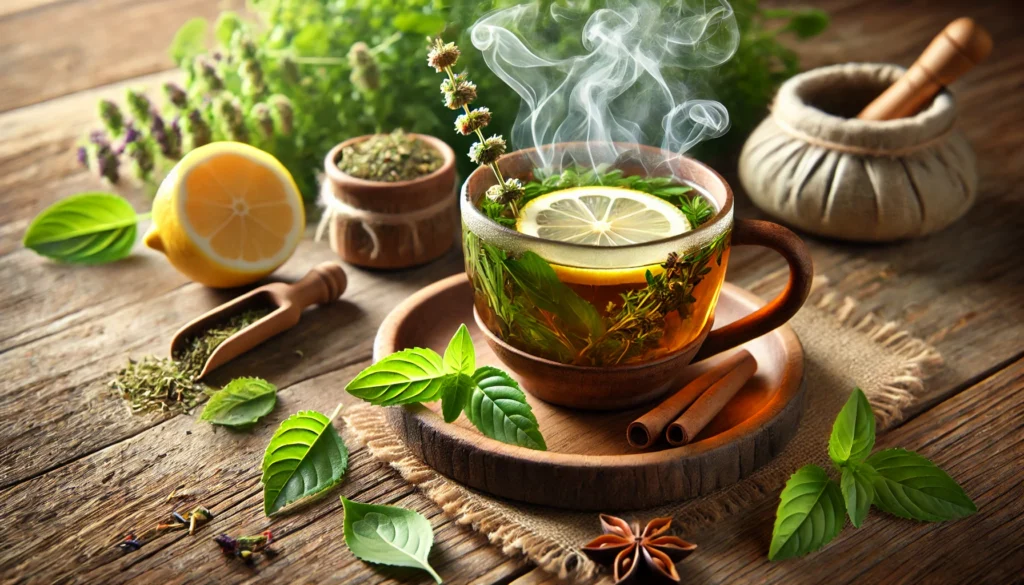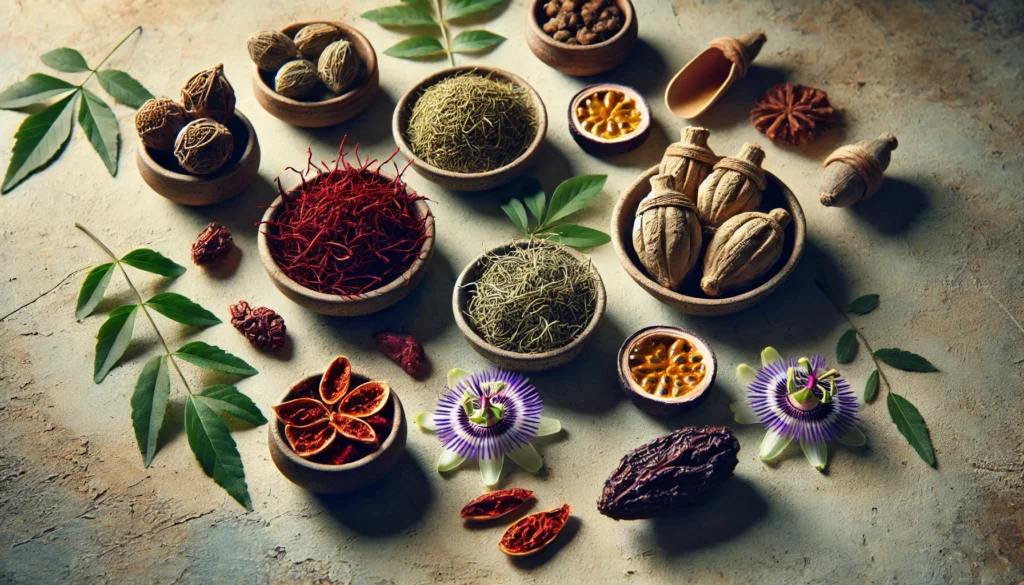The Science of Mood Regulation
Mood regulation is a complex process involving various neurotransmitters and brain regions. Neurotransmitters like serotonin, dopamine, and norepinephrine play critical roles in maintaining emotional balance. Imbalances in these chemicals can lead to mood disorders such as depression and anxiety. Understanding the biological underpinnings of mood can help in identifying effective herbal interventions.
You may also like: Top Herbs to Enhance Your Focus
Environmental and Lifestyle Factors
External factors like stress, diet, and sleep patterns significantly impact mood. Chronic stress can lead to hormonal imbalances, affecting mental health. Similarly, poor dietary choices can result in nutritional deficiencies that exacerbate mood disorders. Lifestyle modifications, alongside herbal remedies, can create a holistic approach to mood enhancement.
Historical Use of Herbs in Mental Health
Herbs have been used for centuries in various cultures to address mental health concerns. Ancient practices from Ayurveda, Traditional Chinese Medicine, and European folk remedies highlight the long-standing belief in the efficacy of herbs. Historical records provide valuable insights into the traditional uses and benefits of these natural substances.
1. St. John’s Wort
Historical Context and Traditional Uses
St. John’s Wort (Hypericum perforatum) has been used for over 2,000 years in European folk medicine. Traditionally, it was employed to ward off evil spirits and treat nervous disorders. The herb’s vibrant yellow flowers were believed to capture the sun’s energy, symbolizing its mood-lifting potential.
Mechanism of Action and Scientific Evidence
The active compounds in St. John’s Wort, such as hypericin and hyperforin, are thought to inhibit the reuptake of neurotransmitters like serotonin. This mechanism is similar to conventional antidepressants, which supports its use in treating mild to moderate depression. Numerous studies have validated its efficacy, although results can vary based on the preparation and dosage.
Precautions and Potential Interactions
Despite its benefits, St. John’s Wort can interact with a wide range of medications, including antidepressants, birth control pills, and anticoagulants. These interactions can reduce the effectiveness of these drugs or increase the risk of side effects. Consulting with a healthcare provider is essential before using this herb to avoid adverse reactions.
2. Ashwagandha
Ayurvedic Roots and Adaptogenic Properties
Ashwagandha (Withania somnifera) is a cornerstone of Ayurvedic medicine, known for its rejuvenating and adaptogenic properties. It is classified as a “rasayana” in Ayurveda, which refers to substances that promote longevity and vitality. The root of the plant is particularly valued for its ability to enhance physical and mental resilience.
Stress Reduction and Cortisol Modulation
Ashwagandha’s adaptogenic effects are primarily attributed to its ability to modulate cortisol levels, the body’s primary stress hormone. By balancing cortisol, ashwagandha helps reduce the physiological impacts of stress, leading to improved mood and mental clarity. Studies have shown that regular consumption of ashwagandha can significantly reduce anxiety and stress levels.
Cognitive Enhancement and Mental Resilience
Beyond stress reduction, ashwagandha may also enhance cognitive function. Research suggests that it can improve memory, attention, and information processing speed. This makes it an attractive option for those seeking to bolster mental resilience and performance, particularly in high-stress environments.
3. Rhodiola Rosea
Traditional Use in Scandinavian and Chinese Medicine
Rhodiola Rosea, also known as the “golden root,” has been used for centuries in traditional medicine systems like Chinese and Scandinavian. It was prized by the Vikings for its ability to enhance endurance and combat fatigue. In Siberian folklore, it is said that those who consumed Rhodiola lived longer and healthier lives.
Enhancing Physical and Mental Endurance
The primary benefit of Rhodiola Rosea lies in its ability to enhance the body’s resistance to physical and mental stress. It is believed to improve energy metabolism and reduce fatigue, which contributes to better mood and increased vitality. This makes it particularly beneficial for individuals experiencing burnout or chronic stress.
Influence on Neurotransmitter Production
Research suggests that Rhodiola Rosea can increase the production of neurotransmitters like serotonin and dopamine, which play vital roles in mood regulation. By promoting neurotransmitter balance, Rhodiola can help alleviate symptoms of depression and anxiety, contributing to overall emotional well-being.

4. Saffron
Culinary Delight with Medicinal Benefits
Saffron (Crocus sativus) is widely known as a culinary spice, but its medicinal properties have been recognized for centuries. In traditional Persian medicine, saffron was used to treat a variety of ailments, including depression. The spice’s vibrant color and distinct aroma are indicative of its potent bioactive compounds.
Clinical Trials and Antidepressant Effects
Recent clinical trials have demonstrated saffron’s effectiveness in alleviating symptoms of depression and anxiety, comparable to conventional antidepressants. The bioactive compounds in saffron, such as crocin and safranal, are thought to influence serotonin levels, contributing to its mood-lifting effects. These findings highlight saffron’s potential as a natural alternative to pharmaceutical treatments.
Safety and Dosage Considerations
While saffron is generally considered safe, high doses can lead to side effects such as nausea, dizziness, and allergic reactions. It is important to adhere to recommended dosages and consult with a healthcare provider before using saffron, especially for individuals with underlying health conditions or those taking other medications.
5. Chamomile
Historical and Cultural Significance
Chamomile (Matricaria chamomilla) has been revered for its soothing properties since ancient times. It was used by the Egyptians, Romans, and Greeks as a natural remedy for various ailments, including anxiety and insomnia. Chamomile’s calming effects have made it a staple in herbal medicine across cultures.
Antioxidant Properties and Relaxation
Rich in antioxidants like apigenin, chamomile has been shown to reduce anxiety and promote relaxation. These compounds interact with neurotransmitter receptors in the brain, fostering a sense of calm. Chamomile tea, in particular, is a popular choice for those seeking a gentle and effective way to unwind.
Mild Mood-Enhancing Effects
While chamomile’s mood-enhancing properties are generally mild, it can be an effective herb for those experiencing stress and sleeplessness. Its gentle nature makes it suitable for all age groups, including children and the elderly, as part of a holistic approach to mental well-being.
6. Lemon Balm
Historical Use and Aromatherapeutic Benefits
Lemon Balm (Melissa officinalis) has a long history of use in reducing stress and anxiety, dating back to the Middle Ages. Its pleasant lemony scent is not only uplifting but also offers aromatherapeutic benefits. Lemon balm was traditionally used to lift the spirits and promote emotional balance.
GABA Modulation and Relaxation
Lemon balm is believed to work by increasing gamma-aminobutyric acid (GABA) levels in the brain, which promotes relaxation. This mechanism of action is similar to that of certain anti-anxiety medications, making lemon balm a natural alternative for stress relief. Research has shown that lemon balm can improve mood and cognitive performance.
Applications in Cognitive Enhancement
Beyond mood enhancement, lemon balm has been studied for its potential to improve cognitive performance. It may enhance memory, attention, and concentration, making it a suitable option for those seeking a natural way to boost mental clarity and emotional well-being.
7. Passionflower
Traditional Uses in Indigenous Cultures
Passionflower (Passiflora incarnata) has been used by indigenous cultures in the Americas for its calming effects. It was traditionally employed to treat anxiety, insomnia, and hysteria. The plant’s intricate and beautiful flowers are symbolic of its complex chemical composition and therapeutic potential.

GABA Enhancement and Sedative Properties
The calming effects of passionflower are attributed to its ability to increase GABA levels, similar to lemon balm. GABA is an inhibitory neurotransmitter that promotes relaxation and reduces neuronal excitability. Passionflower is often recommended for its gentle sedative properties, helping to promote restful sleep and reduce stress-induced mood disturbances.
Incorporating Passionflower into Daily Regimens
Passionflower can be consumed in various forms, including teas, tinctures, and supplements. Incorporating it into a daily wellness routine can help manage stress and improve sleep quality. As with any herb, it is important to follow recommended dosages and consult with a healthcare provider if needed.
8. Valerian Root
Historical Significance and Traditional Use
Valerian Root (Valeriana officinalis) has been used since ancient times for its sedative effects. The Greeks and Romans valued it as a remedy for insomnia and anxiety. The herb was even used during World War II to relieve stress and anxiety among civilians affected by air raids.
Mechanism of Action and Calming Effects
Valerian root contains compounds that may increase the availability of GABA in the brain, leading to a calming effect. Its sedative properties make it a popular choice for treating sleep disorders, but it can also contribute to improved mood by reducing anxiety and promoting relaxation.
Usage Considerations and Best Practices
While valerian root is generally safe, it can cause side effects such as dizziness and headaches in some individuals. It is advisable to start with a low dose and gradually increase as needed. Consulting with a healthcare provider can help determine the appropriate usage based on individual health needs.
9. Holy Basil (Tulsi)
Reverence in Ayurvedic Medicine
Holy Basil (Ocimum sanctum), known as Tulsi in Ayurveda, is revered as a sacred plant with numerous health benefits. It is considered an “elixir of life” for its ability to promote longevity and spiritual well-being. Tulsi is often grown in Indian households and used in religious ceremonies, highlighting its cultural significance.
Stress-Relieving and Cortisol-Balancing Effects
Holy basil is an adaptogenic herb known for its stress-relieving properties. It helps balance cortisol levels, supporting the body’s ability to adapt to stress. Regular consumption of holy basil can lead to enhanced mood, reduced anxiety, and overall mental well-being.
Incorporating Tulsi into Daily Life
Tulsi can be consumed in various forms, including teas, capsules, and fresh leaves. Incorporating it into daily life can provide ongoing support for emotional balance and resilience. Its versatility and safety make it a valuable addition to any wellness routine.
10. Ginkgo Biloba
Cognitive Enhancement and Historical Use
Ginkgo Biloba is renowned for its cognitive-enhancing properties, often used to improve memory and concentration. It has a long history of use in traditional Chinese medicine, where it was believed to support brain health and longevity. Ginkgo’s distinctive fan-shaped leaves are a testament to its ancient lineage.
Antioxidant Properties and Brain Health
The herb’s antioxidant-rich composition helps protect brain cells from oxidative stress, which can contribute to mood disorders. By reducing oxidative damage, ginkgo biloba supports overall brain health and cognitive function. Its neuroprotective effects make it an appealing option for those seeking to enhance mental clarity.
Mood Improvement and Anxiety Reduction
While its primary use is for cognitive support, ginkgo biloba also shows promise in improving symptoms of anxiety and depression. Its ability to improve blood flow to the brain may enhance emotional well-being and mood stability. As with any supplement, consulting with a healthcare provider is recommended to determine appropriate use.

Conclusion
Incorporating mood-boosting herbs into your wellness regimen can offer a natural and effective way to enhance mental health. These herbs provide a diverse array of benefits, from stress reduction and cognitive enhancement to mood stabilization. However, it’s essential to approach herbal remedies with caution, especially when considering potential interactions with other medications. For optimal results, individuals should consult with healthcare professionals to tailor herb usage to their specific needs and conditions.
By understanding the historical context, current applications, and scientific underpinnings of these herbs, health and wellness coaches, science journalists, and biohackers can harness their potential to foster better mental health and emotional balance. Embracing a holistic approach that combines herbal remedies with lifestyle modifications can lead to improved well-being and a more resilient mindset.
Further Reading:
Herbs for Mental and Emotional Health
Happy Herbs: Plants with Mood-Boosting Properties
Herbs, Vitamins, and Supplements Used to Enhance Mood
Important Note: The information contained in this article is for general informational purposes only, and should not be construed as health or medical advice, nor is it intended to diagnose, prevent, treat, or cure any disease or health condition. Before embarking on any diet, fitness regimen, or program of nutritional supplementation, it is advisable to consult your healthcare professional in order to determine its safety and probable efficacy in terms of your individual state of health.
Regarding Nutritional Supplements Or Other Non-Prescription Health Products: If any nutritional supplements or other non-prescription health products are mentioned in the foregoing article, any claims or statements made about them have not been evaluated by the U.S. Food and Drug Administration, and such nutritional supplements or other health products are not intended to diagnose, treat, cure, or prevent any disease.


